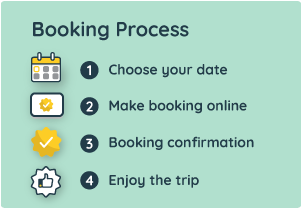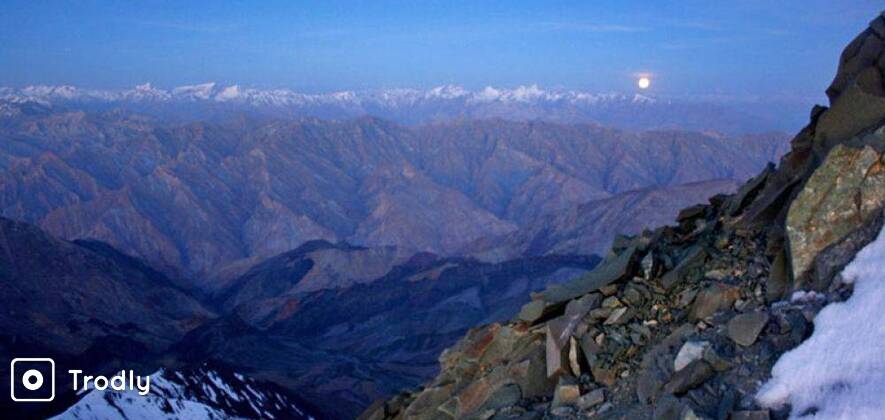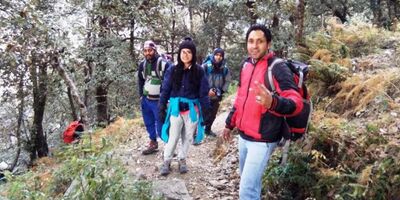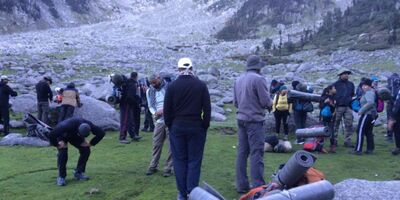Stok Kangri Trek, Ladakh
Trip Overview
Ladakh is home to a number of 6000+m peaks, which have the distinction of being non-technical, trekking peaks.
At 6132m, Stok Kangri is one of the highest amongst such trekking peaks. A trek to the summit takes you through some wonderful landscapes – through narrow valleys amidst barren, jagged mountains, vast snow fields and a breathtaking trek up the steep shoulder of the summit ridge. Stupendous views of the Himalayan range surrounding Leh and even a few 8000m peaks visible on a clear, cloudless day from the summit more than justify the pain and breathlessness.
Given the altitude, proper acclimatization is crucial to even attempt the Stok Kangri summit. Acute Mountain Sickness (AMS) and the related breathlessness and fatigue are all too common for trekkers attempting this peak. A rest day each – one at Leh prior to starting the trek and another at the Base camp are thus included in the itinerary.
Highlights:
- Duration: 9 days
- Grade: Difficult
- Max Altitude: 6132m
- Starts from: Shang, Ladakh, Jammu & Kashmir
- Ends at: Stok, Ladakh, Jammu & Kashmir
- Trek Route: Shang - Shang Phu - Matho Doksa - Gangboche - Mankarmo - Stok Base Camp - Stok Kangri summit - Stok Base Camp - Mankarmo - Changma - Stok
Brief Itinerary:
Day 1: Arrive at Leh (3500m). Pick up from Leh airport and transfer to guest house.
Day 2: Drive to Shang Village (3800m). Overnight stay in Tents
Day 3: Trek from Shang Village (3700m) to Shang Phu (4400m)
Day 4: Trek from Shang Phu (4400m) to Gangboche (4450m) via Shang Phu La (4950m)
Day 5: Trek from Gangboche (4450m) to Mankarmo (4400m) via Mato La (4500m)
Day 6: Trek from Mankarmo (4400m) to Stok Kangri Base camp (4980m)
Day 7: Trek from Stok Base Camp (4980m) to Stok Kangri summit (6132m) & back to Stok Base Camp
Day 8: Trek from Stok base camp to Stok village (3570m) and drive to Leh (3524m)
Day 9: Buffer Day
Detailed Itinerary:
Day 1: At Leh
Get off at the Leh airport and you’re already smitten by the sheer, rugged natural beauty of the mountainous landscape all around! Today is time to relax and get used to the higher altitude of Leh, a part of the all important acclimatization process required for the demanding Stok Kangri Trek.
You also have time to explore the monasteries and palaces in and around Leh, as well as time to visit the Leh market and complete your trek related shopping.
Day 2: Drive to Shang village; Overnight stay in Tents (2 to 3 hours)
After breakfast, we drive to Shang Sumdo village past the Shey & Thicksey monasteries. We will go for small acclimatization walks around the camp. We will stay overnight in Tents.
Day 3: Trek from Shang Sumdo to Shang Phu (6 to 8 hours)
We trek on, ahead into the valley upwards towards the plateau of Shang Phu at a height of 4400m. It is surrounded by snow-capped mountains all around the camp. Overnight stay in Tents.
Day 4: Trek from Shang Phu to Gangboche via Shang Phu La (6 to 8 hours)
Today we ascend almost 900m towards the Shang Phu La, leaving behind the Shang valley and the vast grasslands and meadows. At the top of the pass, you can see ahead towards today’s camp at Gangboche. Traverse down the pass for an hour or so to reach the vast green plateau of Gangboche, crossing meandering streams. Overnight stay in Tents.
Day 5: Trek from Gangboche to Mankarmo (5 to 7 hours)
We will be able to see the Stok Kangri summit today just before the we climb the Mato La pass, the second highest Pass on the trek. From the pass, descend for 2 hours into the Mankarmo village inhabited by local shepherds. Overnight stay in Tents.
Day 6: Trek from Mankarmo to Stok Kangri Base camp (2 to 3 hours)
Today a short trek of 2 to 3 hours takes us to Stok Base Camp, where we will be camped for the next 2 days. Late in the afternoon, we take a short hike towards Stok Advanced Base Camp during the day to help everyone acclimatize better. An early dinner will be followed by instructions to all trekkers to prepare for the tough trek to the summit.
Day 7: Trek from Stok Base Camp to Stok Kangri summit and back (9 to 10 hours)
We leave late in the night on Day 6 itself (around 11:30 pm) for the summit. From Stok Base Camp, the Stok Kangri summit can be reached in about 6 to 7 hours. The trekking however is at an altitude above 5000 metres. Steep slopes and breathlessness make the going difficult and hence the proper acclimatization is the key. Our trek over the last few days through the Shang Valley should ensure proper acclimatization and enable all trekkers to make a strong push towards the summit.
Reaching a Himalayan peak summit is an achievement in itself – and one above 6000m is a feeling that simply cannot be expressed in words. On a clear day, the 360 degree view of Himalayan mountain ranges and peaks is just astounding!
The descent back to Stok Base Camp is easier and quicker, usually taking 3 to 4 hours. Much needed rest and time to reflect on the summit attempt.
Day 8: Trek from Stok Base Camp to Stok village and back to Leh (4 to 5 hours):
The last leg of the Stok Kangri Trek involves descending from Stok Base Camp to Stok village, a downhill trek for 4 to 5 hours, passing through the Mankarmo campsite. A short 30 min drive thereafter to Leh marks the end of the trek. A comfortable stay in the guest house, aptly so, after a tough trek to the highest trekking peak in India!
Day 9
A Buffer day in case the Summit day is delayed due to weather conditions. The additional cost payable at the end of the trek, in case the buffer day is utilized, is INR 1500 per trekker.

Basic Details
Inclusions
- Transfer in vehicle between trek reporting location and base camp / end point of the trek
- Good quality tents, sleeping bags, carry mats and crampons (if and where required). Tented accommodation will be on double / triple sharing basis.
- Safety equipment – first aid kit, stretcher, pulsoximeter, portable oxygen cylinders (where required, for use in case of emergencies only)
- All vegetarian meals (breakfast, lunch and dinner on all trek days) for the trek duration (from base camp onwards till end point of the trek)
- WildBoots trek leader, guide, cook and camp helpers and horses / mules / porters as may be required for carrying the equipment
- Service taxes, permits, fees and other charges imposed by local authorities, national parks, etc.
Exclusions
- Transport costs to reach the reporting location
- Meals, snacks, mineral water, telephone, tips and other incidental expenses during travel to and from base camp / end point of the trek
- Trekkers are expected to trek carrying their own backpack. Those intending to trek without backpacks or carrying only a day-pack and offloading their backpacks onto the horses / mules will have to bear an additional cost.
- Cost of doctors, medical officers. WildBoots trek leaders are trained in First Aid to assist in case of medical emergencies.
- Emergency evacuation related costs owing to personal emergencies or external weather conditions.
Why book with TRODLY
- Best Price Guarantee
- Verified customer reviews that help you make the right decision.
- Qualified operators. All partner operators selected after rigorous system of checks.
- Free Cancellation on Most Trips
- Only Best Trips - Our team of travel experts bring uniquely local, safe, and exciting experiences to the community.
- 100% Secured Payments
Important Information
An essential list of things to carry for a high altitude trek is mentioned below. This list is ideal for a week long (7-8 days) trek. For shorter treks, clothing gear can be reduced while additional warm clothing can be added for winter treks.
- A good quality rucksack (50-60 litres should be sufficient)
- Good quality trekking shoes / boots. Please do not wear regular sports / canvas shoes for the trek.
- 2 pairs of quick-dry, synthetic / cotton trekking pants (1 for trekking, 1 extra)
- 3 quick-dry synthetic / cotton T-shirts (2 for trekking, 1 extra)
- 3 pairs of inner-wear
- 3 pairs of cotton socks
- 1 windcheater OR sweatshirt (fleece or quick-dry synthetic, preferably with hood)
- 1 full-sleeve jacket (light-weight down jacket preferable, if you have one; with hood)
- 1 set of thermal wear (upper and lower)
- 1 raincoat / poncho
- 1 torch / head torch with extra pair of batteries
- 1 monkey cap / beanie
- 1 pair of dark, 100% UV protection sunglasses, dark tints (black, brown or green)
- 1 one litre water bottle (thick plastic or aluminum, BPA free water bottle and not the disposable mineral water bottles please!)
- Personal toiletries (tooth brush, paste, toilet paper, etc.)
- 1 towel (quick dry, light-weight)
- Sunscreen (SPF 30 or higher) and Lip balm
- Personal medication – specific prescribed medicines only, we will be carrying a first aid kit. Paracetamol and Combiflam tablets, a strip of band-aids, an ORS packet, knee caps (most frequently used item!) and Moov or Volini cream are sufficient as part of your personal first aid kit.
- Garbage bags (2-3 small plastic / garbage bags to carry your personal waste items)
Important, Please Note
- Please avoid bringing brand new, unused gear – especially rucksack and trekking shoes / boots for the trek. You should ideally use your trekking gear, most importantly rucksack and trekking shoes / boots for short hikes or treks so as to be comfortable with using the same on the high altitude trek.
- Multi-utility gear such as convertible track pants, waterproof & windproof jacket helps reduce gear to be carried
- All gear should also be light-weight and less bulky, without compromising on the protection it is to offer.
- Alcohol & all other types of intoxicants are strictly prohibited and should not be carried on the treks. All kinds of intoxicants not only impale the decision-making process of your brain, but it also affects the oxygen-carrying capacity which can be a big issue on the heights.
- Please carry plastic bags to compartmentalize your belongings in your rucksack but make sure you do not leave anything behind on the trail. Remember we are guests on the mountains & do not own the trail. It is our responsibility to leave the trail in a better condition than we see it in. Please carry jute bag instead of plastic if possible.
Cancellation Policy
- 75% refund if cancelled before 45 days
- 50% refund if cancelled before 30 days
- No refund after that
Meet-up Information/Reporting Point

Get trip inspirations, offers and more.










